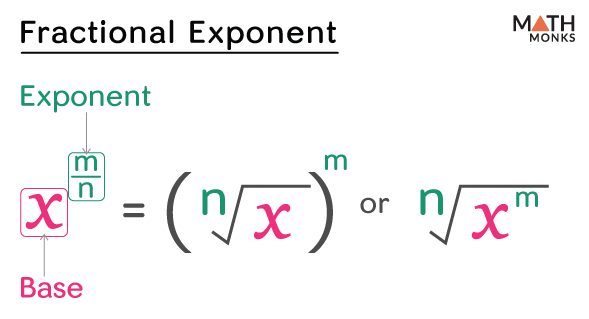A fractional, or rational, exponent is an exponent written as a fraction. In this fraction, the numerator specifies the power to which the base is raised, while the denominator indicates the root that is applied to the base.
For example, the expression ${x^{\dfrac{m}{n}}}$ can be interpreted as taking the nth root of x and then raising the result to the mth power. On the other hand, it also can be interpreted as raising x to the mth power and then taking the nth root of the result.
Mathematically, in the general form, it is expressed as:
${x^{\dfrac{m}{n}}}$
= ${\left( \sqrt[n]{x}\right) ^{m}}$ or ${\sqrt[n]{x^{m}}}$
Here,
x = base
${\dfrac{m}{n}}$ is the fractional exponent
${5^{\dfrac{1}{2}}}$, ${7^{\dfrac{2}{3}}}$, ${3^{\dfrac{1}{4}}}$, and ${2^{\dfrac{2}{5}}}$ are a few examples of fractional exponents.
Fractional exponents follow the same rules as whole-number exponents but with an additional consideration for the root:
${x^{\dfrac{1}{n}}}$ = ${\sqrt[n]{x}}$
${x^{\dfrac{1}{m}}\times x^{\dfrac{1}{n}}}$ = ${x^{\left( \dfrac{1}{m}+\dfrac{1}{n}\right) }}$
${x^{\dfrac{1}{m}}\div x^{\dfrac{1}{n}}}$ = ${x^{\left( \dfrac{1}{m}-\dfrac{1}{n}\right) }}$
${x^{\dfrac{1}{m}}\times y^{\dfrac{1}{n}}}$ = ${\left( xy\right) ^{\dfrac{1}{n}}}$
${x^{\dfrac{1}{n}}\div y^{\dfrac{1}{n}}}$ = ${\left( x\div y\right) ^{\dfrac{1}{n}}}$
${x^{-\dfrac{m}{n}}}$ = ${\left( \dfrac{1}{x}\right) ^{\dfrac{m}{n}}}$
${\left( x^{\dfrac{m}{n}}\right) ^{\dfrac{p}{q}}}$ = ${x^{\left( \dfrac{m}{n}\times \dfrac{p}{q}\right) }}$
${x^{\dfrac{0}{n}}}$ = ${1}$
Let us now simplify some rational exponents using the above rules.
For simplifying ${\left( \dfrac{27}{64}\right) ^{\dfrac{1}{3}}}$ …..(i)
Since ${\left( x\div y\right) ^{\dfrac{1}{n}}}$ = ${x^{\dfrac{1}{n}}\div y^{\dfrac{1}{n}}}$
Let x = 27 and y = 64
Now, ${x^{\dfrac{1}{n}}}$ = ${${27^{\dfrac{1}{3}}}$ = ${\sqrt[3]{27}}$ = 3
${y^{\dfrac{1}{n}}}$ = ${${64^{\dfrac{1}{3}}}$ = ${\sqrt[3]{64}}$ = 4
Substituting these values in (i), we get
${\left( \dfrac{27}{64}\right) ^{\dfrac{1}{3}}}$
= ${27^{\dfrac{1}{3}}\div 64^{\dfrac{1}{3}}}$
= ${3\div 4}$
= ${\dfrac{3}{4}}$
Thus, the fractional exponent ${\left( \dfrac{27}{64}\right) ^{\dfrac{1}{3}}}$ is simplified to ${\dfrac{3}{4}}$
Multiplying
Let us multiply ${3^{\dfrac{2}{3}}}$ and ${5^{\dfrac{2}{3}}}$
Since ${x^{\dfrac{1}{n}}\times y^{\dfrac{1}{n}}}$ = ${\left( xy\right) ^{\dfrac{1}{n}}}$
Now, ${3^{\dfrac{2}{3}}\times 5^{\dfrac{2}{3}}}$
= ${\left( 3\times 5\right) ^{\dfrac{2}{3}}}$
= ${15^{\dfrac{2}{3}}}$
Thus, the product is ${15^{\dfrac{2}{3}}}$
Multiply ${7^{\dfrac{1}{2}}}$ and ${7^{\dfrac{4}{5}}}$
Solution:
As we know,
Simplify the rational exponent ${3\left( 5x^{\dfrac{1}{3}}\right) \left( x^{\dfrac{7}{3}}\right)}$
Solution:
As we know,
Dividing
If we divide ${y^{\dfrac{2}{3}}}$ by ${y^{\dfrac{1}{7}}}$
Since ${x^{\dfrac{1}{m}}\div x^{\dfrac{1}{n}}}$ = ${x^{\left( \dfrac{1}{m}-\dfrac{1}{n}\right) }}$
Now, ${y^{\dfrac{2}{3}}\div y^{\dfrac{1}{7}}}$
= ${y^{\left( \dfrac{2}{3}-\dfrac{1}{7}\right) }}$
= ${y^{\left( \dfrac{14-3}{21}\right) }}$
= ${y^{\dfrac{11}{21}}}$
Thus, the quotient is ${y^{\dfrac{11}{21}}}$
Divide ${4^{\dfrac{7}{5}}}$ by ${2^{\dfrac{7}{5}}}$
Solution:
As we know,
Let us consider a fractional exponent ${81^{-\dfrac{1}{2}}}$ where the exponent ${-\dfrac{1}{2}}$ is negative.
Since ${x^{-\dfrac{m}{n}}}$ = ${\left( \dfrac{1}{x}\right) ^{\dfrac{m}{n}}}$
Now, ${81^{-\dfrac{1}{2}}}$
= ${\left( \dfrac{1}{81}\right) ^{\dfrac{1}{2}}}$
= ${\left( \dfrac{1}{9^{2}}\right) ^{\dfrac{1}{2}}}$
Since ${2}$ and ${\dfrac{1}{2}}$ cancel each other, the reduced form is ${\dfrac{1}{9}}$
Radical and fractional exponents are alternate ways of expressing the same expression. Here is the table showing equivalent ways to express both.
Radical Exponents Fractional Exponents ${\sqrt{65}}$ ${65^{\dfrac{1}{2}}}$ ${\sqrt[7]{83}}$ ${83^{\dfrac{1}{7}}}$ ${\sqrt[3]{343}}$ ${343^{\dfrac{1}{3}}}$ ${\sqrt[5]{32}}$ ${32^{\dfrac{1}{5}}}$

